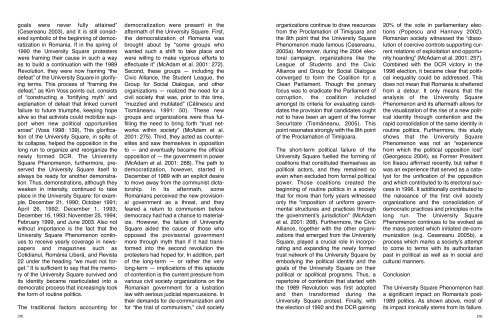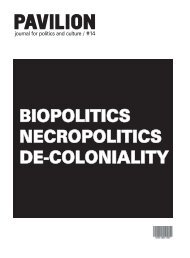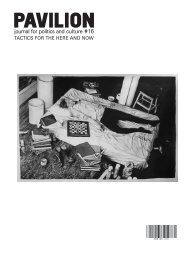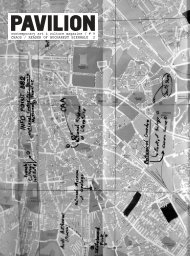PAVILION
PAVILION
PAVILION
- No tags were found...
Create successful ePaper yourself
Turn your PDF publications into a flip-book with our unique Google optimized e-Paper software.
goals were never fully attained”<br />
(Cesereanu 2003), and it is still considered<br />
symbolic of the beginning of democratization<br />
in Romania. If in the spring of<br />
1990 the University Square protesters<br />
were framing their cause in such a way<br />
as to build a continuation with the 1989<br />
Revolution, they were now framing “the<br />
defeat” of the University Square in glorifying<br />
terms. This process of “framing the<br />
defeat,” as Kim Voss points out, consists<br />
of “constructing a ’fortifying myth’ and<br />
explanation of defeat that linked current<br />
failure to future triumphs, keeping hope<br />
alive so that activists could mobilize support<br />
when new political opportunities<br />
arose” (Voss 1998: 139), This glorification<br />
of the University Square, in spite of<br />
its collapse, helped the opposition in the<br />
long run to organize and reorganize the<br />
newly formed DCR. The University<br />
Square Phenomenon, furthermore, preserved<br />
the University Square itself to<br />
always be ready for another demonstration.<br />
Thus, demonstrations, although they<br />
weaken in intensity, continued to take<br />
place in the University Square: for example,<br />
December 21, 1990; October 1991;<br />
April 26, 1992; December 1, 1993;<br />
December 16, 1993; November 25, 1994;<br />
February 1999, and June 2003. Also not<br />
without importance is the fact that the<br />
University Square Phenomenon continues<br />
to receive yearly coverage in newspapers<br />
and magazines such as<br />
Cotidianul, România Liberă, and Revista<br />
22 under the heading “we must not forget.”<br />
It is sufficient to say that the memory<br />
of the University Square survived and<br />
its identity became rearticulated into a<br />
democratic process that increasingly took<br />
the form of routine politics.<br />
The traditional factors accounting for<br />
democratization were present in the<br />
aftermath of the University Square. First,<br />
the democratization of Romania was<br />
brought about by “some groups who<br />
wanted such a shift to take place and<br />
were willing to make vigorous efforts to<br />
effectuate it” (McAdam et al. 2001: 272).<br />
Second, these groups ― including the<br />
Civic Alliance, the Student League, the<br />
Group for Social Dialogue, and other<br />
organizations ― realized the need for a<br />
civil society that was, prior to this time,<br />
“muzzled and mutilated” (Călinescu and<br />
Tismăneanu 1991: 50). These new<br />
groups and organizations were thus fulfilling<br />
the need to bring forth “trust networks<br />
within society” (McAdam et al.<br />
2001: 275). Third, they acted as counterelites<br />
and saw themselves in opposition<br />
to ― and eventually became the official<br />
opposition of ― the government in power<br />
(McAdam et al. 2001: 268). The path to<br />
democratization, however, started in<br />
December of 1989 with an explicit desire<br />
to move away from the communist dictatorship.<br />
In its aftermath, some<br />
Romanians perceived the new provisional<br />
government as a threat, and they<br />
feared a return to communism before<br />
democracy had had a chance to materialize.<br />
However, the failure of University<br />
Square aided the cause of those who<br />
opposed the provisional government<br />
more through myth than if it had transformed<br />
into the second revolution the<br />
protesters had hoped for. In addition, part<br />
of the long-term ― or rather the very<br />
long-term ― implications of this episode<br />
of contention is the current pressure from<br />
various civil society organizations on the<br />
Romanian government for a lustration<br />
law with serious judicial repercussions. In<br />
their demands for de-communization and<br />
for “the trial of communism,” civil society<br />
organizations continue to draw resources<br />
from the Proclamation of Timişoara and<br />
the 8th point that the University Square<br />
Phenomenon made famous (Cesereanu,<br />
2005a). Moreover, during the 2004 electoral<br />
campaign, organizations like the<br />
League of Students and the Civic<br />
Alliance and Group for Social Dialogue<br />
converged to form the Coalition for a<br />
Clean Parliament. Though the primary<br />
focus was to eradicate the Parliament of<br />
corruption, the coalition included<br />
amongst its criteria for evaluating candidates<br />
the provision that candidates ought<br />
not to have been an agent of the former<br />
Securitate (Tismăneanu, 2005). This<br />
point resonates strongly with the 8th point<br />
of the Proclamation of Timişoara.<br />
The short-term political failure of the<br />
University Square fuelled the forming of<br />
coalitions that constituted themselves as<br />
political actors, and they remained so<br />
even when excluded from formal political<br />
power. Those coalitions created the<br />
beginning of routine politics in a society<br />
that for more than forty years witnessed<br />
only the “imposition of uniform governmental<br />
structures and practices through<br />
the government’s jurisdiction” (McAdam<br />
et al. 2001: 268). Furthermore, the Civic<br />
Alliance, together with the other organizations<br />
that emerged from the University<br />
Square, played a crucial role in incorporating<br />
and expanding the newly formed<br />
trust network of the University Square by<br />
embodying the political identity and the<br />
goals of the University Square on their<br />
political or apolitical programs. Thus, a<br />
repertoire of contention that started with<br />
the 1989 Revolution was first adopted<br />
and then transformed during the<br />
University Square protest. Finally, with<br />
the election of 1992 and the DCR gaining<br />
20% of the vote in parliamentary elections<br />
(Popescu and Hannavy 2002),<br />
Romanian society witnessed the “dissolution<br />
of coercive controls supporting current<br />
relations of exploitation and opportunity<br />
hoarding” (McAdam et al. 2001: 257).<br />
Combined with the DCR victory in the<br />
1996 election, it became clear that political<br />
inequality could be addressed. This<br />
does not mean that Romania is sheltered<br />
from a detour. It only means that the<br />
analysis of the University Square<br />
Phenomenon and its aftermath allows for<br />
the visualization of the rise of a new political<br />
identity through contention and the<br />
rapid consolidation of the same identity in<br />
routine politics. Furthermore, this study<br />
shows that the University Square<br />
Phenomenon was not an “experience<br />
from which the political opposition lost”<br />
(Georgescu 2004), as Former President<br />
Ion Iliescu affirmed recently, but rather it<br />
was an experience that served as a catalyst<br />
for the unification of the opposition<br />
and which contributed to its electoral success<br />
in 1996. It additionally contributed to<br />
the naissance of the first civil society<br />
organizations and the consolidation of<br />
democratic practices and principles in the<br />
long run. The University Square<br />
Phenomenon continues to be evoked as<br />
the mass protest which initiated de-communization<br />
(e.g. Cesereanu 2005b), a<br />
process which marks a society’s attempt<br />
to come to terms with its authoritarian<br />
past in political as well as in social and<br />
cultural manners.<br />
Conclusion<br />
The University Square Phenomenon had<br />
a significant impact on Romania’s post-<br />
1989 politics. As shown above, most of<br />
its impact ironically stems from its failure.<br />
[38]<br />
[39]








